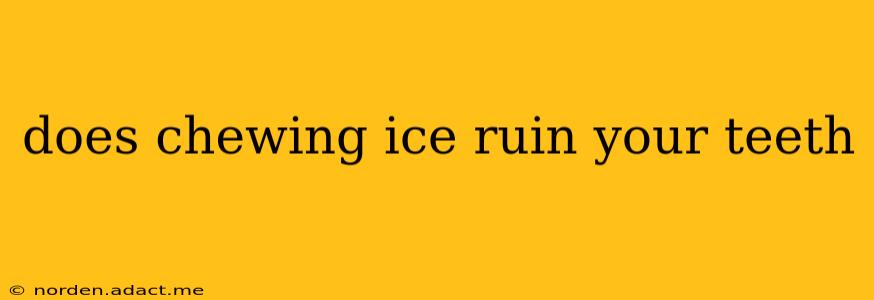Chewing ice might seem harmless, even refreshing, but the reality is that this habit can significantly damage your teeth. While the occasional ice chip might not cause immediate problems, habitually crunching on ice cubes puts your dental health at serious risk. This comprehensive guide explores the potential damage, provides preventative measures, and answers common questions surrounding this seemingly innocuous habit.
How Does Chewing Ice Damage Teeth?
The hard, brittle nature of ice makes it a potent force against your tooth enamel, the protective outer layer. When you chew ice, you're essentially creating a miniature impact each time. These repeated impacts can lead to several problems:
- Cracked or chipped teeth: The force of biting down on ice can easily fracture or chip your teeth, especially if they're already weakened. This can lead to sensitivity, pain, and the need for extensive dental work.
- Fractured fillings or crowns: If you have existing dental work, such as fillings or crowns, the stress from chewing ice can cause them to crack or break, requiring replacement.
- Enamel erosion: The repeated abrasion from ice weakens and wears away your enamel, making your teeth more susceptible to cavities and sensitivity. This damage is cumulative and often irreversible.
- Increased tooth sensitivity: As your enamel wears away, the underlying dentin, a softer layer of your tooth, becomes exposed. This makes your teeth more sensitive to temperature changes, sweet foods, and acidic drinks.
What are the Signs of Ice-Chewing Damage?
Recognizing the early signs of ice-chewing damage is crucial to prevent further harm. Look out for:
- Sudden sharp pain when biting down: This can indicate a crack or chip in a tooth.
- Increased tooth sensitivity: Sensitivity to hot or cold foods and drinks is a common sign of enamel erosion.
- Visible cracks or chips in your teeth: Examine your teeth closely in a mirror for any signs of damage.
- Discolored teeth: Enamel erosion can lead to discoloration of the teeth.
How Can I Stop Chewing Ice?
Breaking the habit of chewing ice can be challenging, but it's essential for maintaining good oral health. Here are some helpful strategies:
- Identify your triggers: Understanding why you chew ice (e.g., boredom, thirst) can help you find alternative coping mechanisms.
- Find healthier alternatives: Satisfy your need for a cold sensation with ice water, frozen fruit, or sugar-free popsicles.
- Gradual reduction: Instead of abruptly stopping, try gradually reducing your ice consumption.
- Mindfulness techniques: Practice mindful eating and pay attention to your chewing habits.
- Seek professional help: If you struggle to break the habit on your own, consider seeking help from a therapist or counselor.
Is it okay to chew ice occasionally?
While the occasional ice chip probably won't cause significant damage, making it a regular habit is highly discouraged. The cumulative effect of repeated impacts is what leads to the problems described above. Moderation is key.
Can chewing ice lead to other dental problems?
Yes, the damage caused by chewing ice can increase your risk of developing other dental problems, such as cavities, gum disease, and tooth decay. The weakened enamel makes your teeth more vulnerable to these issues.
How can I repair damage caused by chewing ice?
Repairing damage caused by chewing ice depends on the severity of the damage. Minor chips or cracks might be repaired with bonding, while more extensive damage may require crowns or other restorative procedures. Your dentist can assess the damage and recommend the best course of action. Early intervention is crucial to minimize further damage and restore your teeth's health.
Conclusion
Chewing ice may seem like a harmless habit, but it can have severe consequences for your teeth. The risk of cracked teeth, enamel erosion, and increased sensitivity is real. By understanding the potential risks and implementing preventative measures, you can protect your teeth and maintain a healthy smile for years to come. If you are concerned about your ice-chewing habit, consult your dentist for professional advice and guidance.
